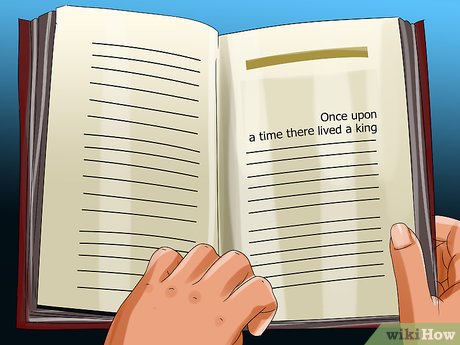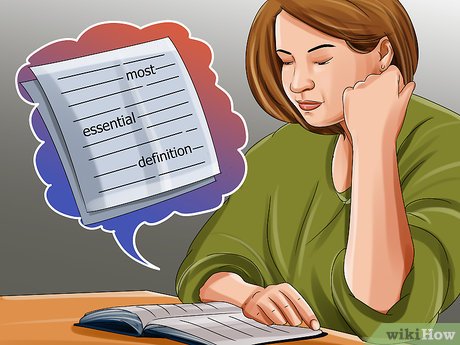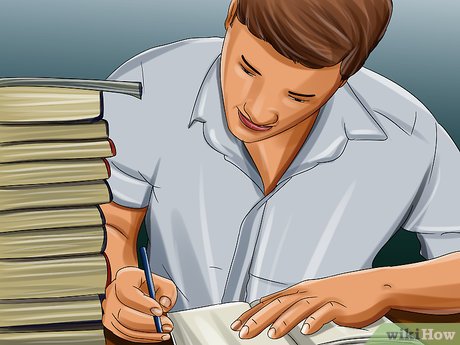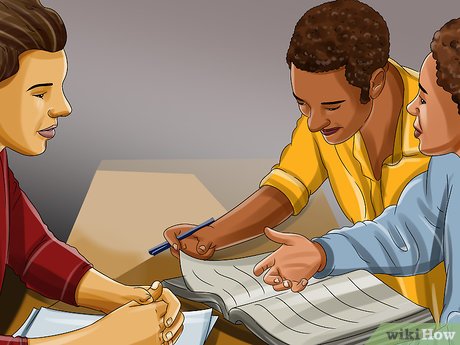How to Read for Graduate School
Method 1 of 3:
Learning to Read Faster
-
 Practice skimming. Skimming is a technique that helps you read for specific information. Instead of trying to read every single word in a book or article, try honing in on key parts. For example, read the first sentence of each paragraph. This will help you identify main ideas.[1]
Practice skimming. Skimming is a technique that helps you read for specific information. Instead of trying to read every single word in a book or article, try honing in on key parts. For example, read the first sentence of each paragraph. This will help you identify main ideas.[1]- If you are reading an article, focus on the first and last paragraphs. These areas are typically where authors will state and re-state their arguments.
- Jot down any unfamiliar terms or concepts and come back to them later.
-
 Look for signposts. Signposts are words or phrases that indicate the author is saying something significant. As you skim, look for words like 'most,' 'essential,' 'definition,' and 'thesis.' Depending on which discipline you are studying, you might come up with your own set of signposts to look for. [2]
Look for signposts. Signposts are words or phrases that indicate the author is saying something significant. As you skim, look for words like 'most,' 'essential,' 'definition,' and 'thesis.' Depending on which discipline you are studying, you might come up with your own set of signposts to look for. [2] -
 Read for 25 minutes, then take a 5 minute break. You might think that reading for as long as possible will help you get through that massive stack of books. However, it's actually better to break reading up in manageable chunks. Your brain can better process information that way.[3]
Read for 25 minutes, then take a 5 minute break. You might think that reading for as long as possible will help you get through that massive stack of books. However, it's actually better to break reading up in manageable chunks. Your brain can better process information that way.[3]- Set a timer for 25 minutes and read until it dings. During this time, don't check your phone, look at email, or do anything other than read.
- After your 25 minute timer goes off, set it for 5 minutes and take a break. Do some stretches, grab some water, and after 5 minutes, get back to reading.
-
 Take notes as you read. Taking notes will help you recall what you've read. It doesn't matter whether you take notes in the margins, on a notepad, or on your laptop--just take notes. You might write down critiques, observations, or questions.[4]
Take notes as you read. Taking notes will help you recall what you've read. It doesn't matter whether you take notes in the margins, on a notepad, or on your laptop--just take notes. You might write down critiques, observations, or questions.[4]- Taking good notes will also help you be an active participant in classroom discussions.
-
 Create a good reading environment. It only makes sense that you will read faster if you don't have to worry about distractions. Find a place to do your reading that is comfortable and conducive to concentrating. You might try having a place at home and a couple of other locations for when you need a change of scenery.[5]
Create a good reading environment. It only makes sense that you will read faster if you don't have to worry about distractions. Find a place to do your reading that is comfortable and conducive to concentrating. You might try having a place at home and a couple of other locations for when you need a change of scenery.[5]- At home, set aside an area where there is no television. It might be a quiet corner in your bedroom, for example. Let others know that when you're in your reading area you're not to be disturbed.
- If you like working in silence, find a good study table in an isolated corner of the library.
- Find a good coffee shop if you like to work with a little background noise.
-
 Increase your reading speed by practicing each day. Don't worry about spending money on a pricey and time-consuming speed reading course. You can increase your reading speed by practicing each day for 15-20 minutes. All you need to do is focus on how fast you are reading,and then challenge yourself to go faster. This might feel uncomfortable at first, but you'll get better with time.
Increase your reading speed by practicing each day. Don't worry about spending money on a pricey and time-consuming speed reading course. You can increase your reading speed by practicing each day for 15-20 minutes. All you need to do is focus on how fast you are reading,and then challenge yourself to go faster. This might feel uncomfortable at first, but you'll get better with time.- Practice with materials that are enjoyable and not too complicated. After you read, quiz yourself to make sure you are retaining information.
- Clock yourself each day so you can measure your results and see if speed reading is working for you.
Method 2 of 3:
Reading More Effectively
-
 Start by reading book reviews to familiarize yourself with the book. Academic journals publish reviews of most recent books in a specific field. For example, The Journal of American History publishes relevant reviews on that subject. Book reviews can be a really useful tool. They are typically 1-3 pages and highlight the key points of an author's argument. Get in the habit of reading reviews for each book you are assigned. [6]
Start by reading book reviews to familiarize yourself with the book. Academic journals publish reviews of most recent books in a specific field. For example, The Journal of American History publishes relevant reviews on that subject. Book reviews can be a really useful tool. They are typically 1-3 pages and highlight the key points of an author's argument. Get in the habit of reading reviews for each book you are assigned. [6]- The reviews will give you insight into what the book is about and what topics it covers. You'll know what you're looking for when you begin to read the actual book.
- Make sure to read more than 1 review so that you don't just get 1 reviewer's opinion.
-
 Read the introduction, conclusion, and table of contents to find the argument. You are reading for big ideas in graduate school, not for every minute detail. Authors will generally introduce you to their argument in the introduction and reiterate it in the conclusion. Once you understand their main point, you can usually skim the rest of the book to find examples that support that argument.[7]
Read the introduction, conclusion, and table of contents to find the argument. You are reading for big ideas in graduate school, not for every minute detail. Authors will generally introduce you to their argument in the introduction and reiterate it in the conclusion. Once you understand their main point, you can usually skim the rest of the book to find examples that support that argument.[7]- The table of contents lets you see how the book is organized and what topics are most important.
-
 Write down answers to useful questions to help understand the main points. Instead of trying to write down every detail, focus on the big picture. As you read, jot down questions and answers that will help you grasp the argument. You can also write down important quotes--just don't forget the page number! Some good questions might be:[8]
Write down answers to useful questions to help understand the main points. Instead of trying to write down every detail, focus on the big picture. As you read, jot down questions and answers that will help you grasp the argument. You can also write down important quotes--just don't forget the page number! Some good questions might be:[8]- What is the author's thesis?
- What are some ways that they support their argument?
- Are the sources sound?
- What could this book do better?
-
 Read the material more closely, if time allows. Skimming and looking for the main points will likely be good enough to give you a decent understanding of the material. But if this book is relevant and important to your own research, take the time to go back and read the entire book or article.
Read the material more closely, if time allows. Skimming and looking for the main points will likely be good enough to give you a decent understanding of the material. But if this book is relevant and important to your own research, take the time to go back and read the entire book or article.- You don't have to do this right away. You can set it aside with a note to come back to it later.
Method 3 of 3:
Managing Your Time and Resources
-
 Set clear goals. A great way to keep yourself on track is to set manageable goals. Assess your reading for the week and then figure out a way you can break it into manageable chunks. You might decide to do this based on the number of pages or chapters you want to get through each day.[9]
Set clear goals. A great way to keep yourself on track is to set manageable goals. Assess your reading for the week and then figure out a way you can break it into manageable chunks. You might decide to do this based on the number of pages or chapters you want to get through each day.[9]- For example, if you have 3 books to read this week, set a goal of getting through 1 book every 2 days.
-
 Utilize helpful technology. You can use several easy strategies to make getting through your workload easier. For example, there are now electronic versions of many books and most journal articles. Try downloading them to your phone so that you can read them while you're on the go.[10]
Utilize helpful technology. You can use several easy strategies to make getting through your workload easier. For example, there are now electronic versions of many books and most journal articles. Try downloading them to your phone so that you can read them while you're on the go.[10]- Use the voice recorder app on your phone to take notes while you read. This might be faster than writing down your thoughts.
- Try programs such as EndNote and OneNote that will help you organize your reading notes.
-
 Give yourself a break. You might feel a lot of pressure to make it through your workload, but remember to be kind to yourself. Set aside time each day to do something relaxing. You might meet up with a friend, go for a hike, or watch a movie. This will help refresh you so you'll actually be able to retain information better. [11]
Give yourself a break. You might feel a lot of pressure to make it through your workload, but remember to be kind to yourself. Set aside time each day to do something relaxing. You might meet up with a friend, go for a hike, or watch a movie. This will help refresh you so you'll actually be able to retain information better. [11]- It might be a challenge, but make sure you're getting enough sleep. No one functions well if they're not getting enough rest. Shoot for 7-9 hours a night.
-
 Prioritize your reading load. You may have weeks where you're just not able to get it all done. If that happens, set priorities for what absolutely needs to be done and what can wait. For example, if you've been struggling in one of your classes, make sure that you do those readings first. You don't want to fall farther behind. [12]
Prioritize your reading load. You may have weeks where you're just not able to get it all done. If that happens, set priorities for what absolutely needs to be done and what can wait. For example, if you've been struggling in one of your classes, make sure that you do those readings first. You don't want to fall farther behind. [12]- If you really find yourself in a jam, talk to your professor. Explain your situation and ask for advice about which topic is most important to focus on that week.
-
 Work with your classmates. Your graduate school classmates can be one of your greatest resources. Either create or join a study group and figure out ways to help each other. For example, you might be able to divide up some of the reading load and share notes. [13]
Work with your classmates. Your graduate school classmates can be one of your greatest resources. Either create or join a study group and figure out ways to help each other. For example, you might be able to divide up some of the reading load and share notes. [13]- You might also decide to set up a weekly meeting to go over the material and help each other answer questions.
Share by
Lesley Montoya
Update 24 March 2020














